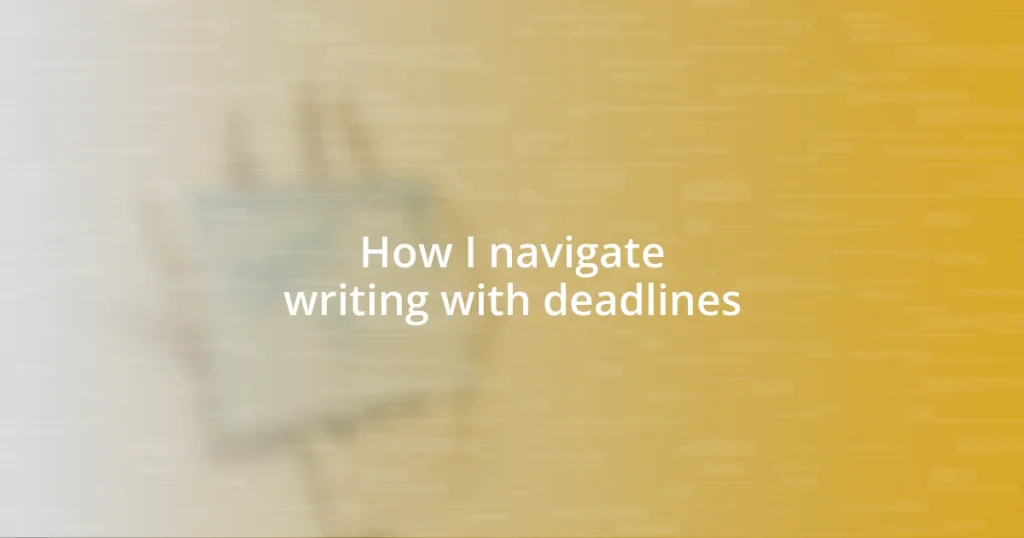Key takeaways:
- Deadlines enhance focus and accountability, revealing creativity under pressure.
- Establishing a personalized writing process and a structured schedule helps in managing workload effectively.
- Incorporating self-reflection and feedback is essential for refining and improving writing quality.
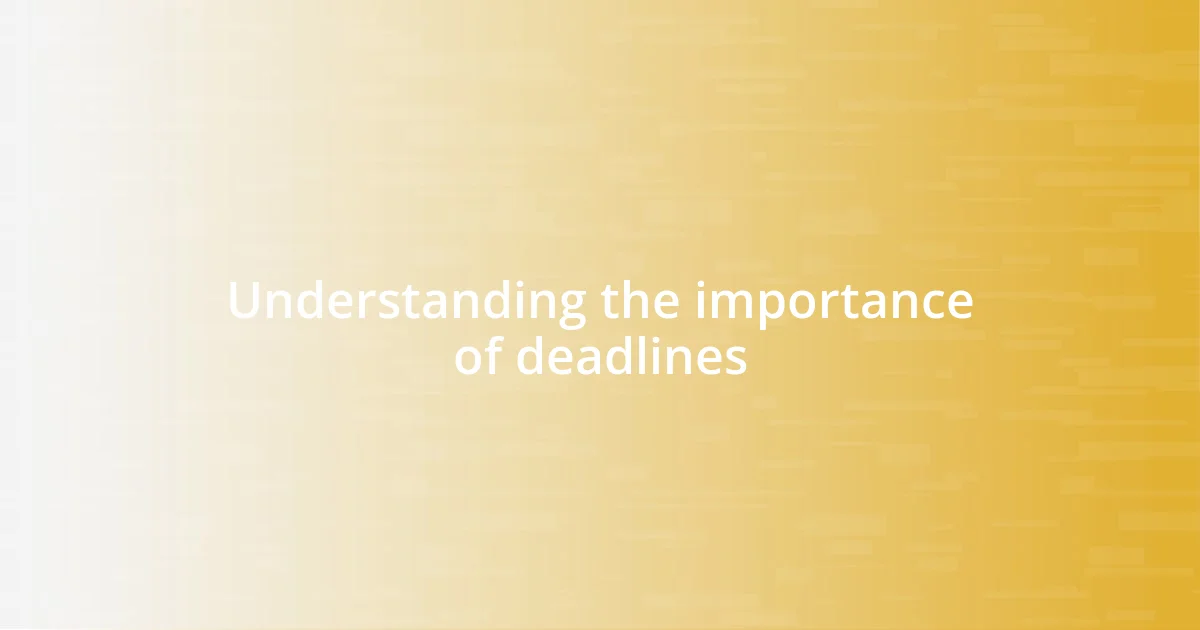
Understanding the importance of deadlines
Deadlines are more than just dates on a calendar; they create a sense of urgency that can significantly sharpen our focus. I remember when I worked on an article for a major publication, and the pressure of an impending deadline motivated me to sift through my thoughts more critically. Have you ever noticed how you sometimes discover your best ideas when time is short?
When I miss deadlines, it doesn’t just impact my schedule; it often leaves me feeling anxious and disorganized. I think about that last-minute scramble to pull everything together and how it drains my creativity. Isn’t it interesting how a well-set deadline can actually unleash our potential rather than hinder it?
Moreover, deadlines instill a sense of accountability, not just to ourselves but to those relying on our work. During college, group projects taught me this firsthand; when one person missed a deadline, we all felt the ripple effect. Don’t we all have that experience where a commitment to a timeline ignites a little friendly competition and pushes us to elevate our game?

Identifying your writing process
Identifying your writing process is crucial to meeting deadlines effectively. I’ve found that everyone has a unique style—some are planners, while others thrive in spontaneity. Personally, I’ve leaned toward outlining my ideas before diving into writing. A few months ago, while preparing for a tight time frame on a blog post, I created a simple bullet-point outline. This tiny shift gave me a clear pathway to follow, allowing my thoughts to flow more smoothly, especially under pressure. What’s your writing approach?
I’ve also noticed that my environment plays a significant role in my writing process. When I set up a dedicated writing space, free from distractions, I can focus better and maintain momentum. One afternoon, I turned off my phone and brewed a pot of coffee, which turned a usual afternoon slog into a productive session; I finished an article earlier than expected and felt a surge of accomplishment. Have you ever experienced that rush of productivity just by changing your surroundings?
Lastly, understanding how I work best—whether through morning bursts of creativity or quiet evenings—can help me tailor my writing process. I’ve found that self-reflection helps me adapt. Around deadlines, I often assess which strategies yield better results. This continual refinement enhances my ability to navigate the pressures of writing. Through experimenting with different techniques, I discover what pushes me to perform at my best.
| Writing Type | Approach |
|---|---|
| Planner | Creates outlines and schedules to guide the process |
| Spontaneous | Writes freely without a predefined structure |
| Environment Focused | Adjusts surroundings to enhance focus and creativity |
| Time of Day Preference | Identifies peak productivity times for writing |
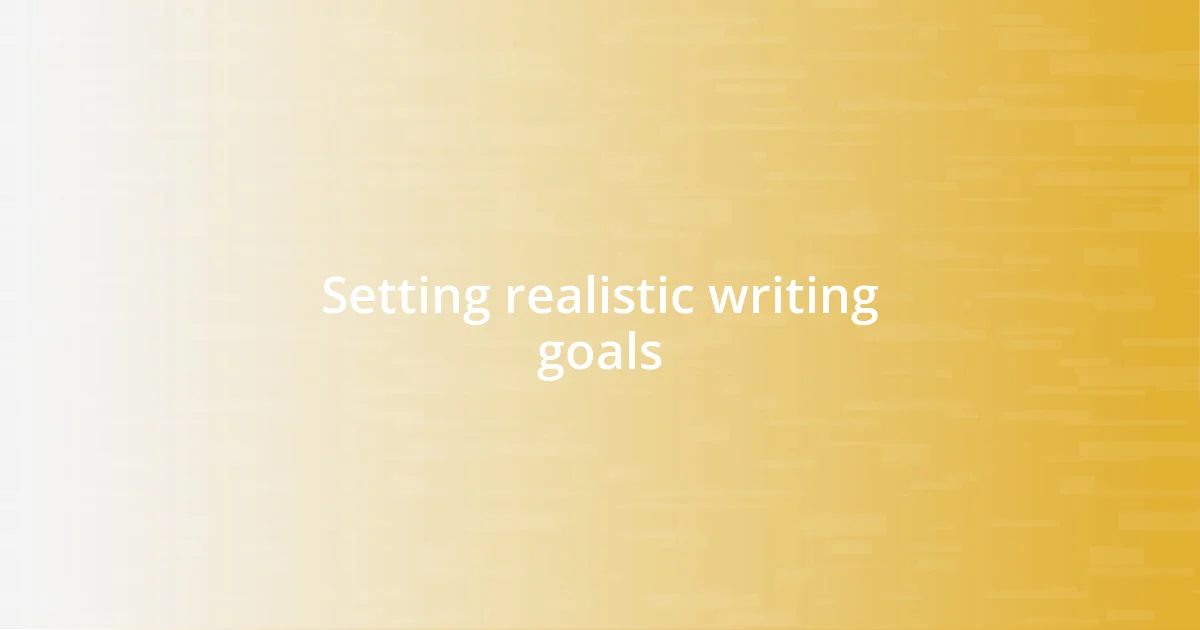
Setting realistic writing goals
Setting realistic writing goals is an essential part of managing deadlines effectively. I’ve learned that defining what I can realistically accomplish within a specific timeframe helps reduce stress and fosters a sense of achievement. For me, breaking larger tasks into smaller, manageable goals makes all the difference. I remember working on a project that seemed daunting at first, but when I divided it into a series of smaller targets, I felt a surge of motivation each time I checked something off my list. Doesn’t it feel amazing to celebrate those small wins?
Here are some key points to consider for setting realistic writing goals:
- Assess Your Availability: Consider your schedule and commitments to set goals that fit comfortably within your life.
- Be Specific: Instead of vague goals, outline clear objectives like “write 500 words a day” rather than just “work on writing.”
- Include Buffer Time: Life happens! Build in extra time to account for unexpected delays or revisions.
- Stay Flexible: Adjust your goals based on how you’re progressing. Sometimes, reevaluating can lead to greater efficiency.
- Reflect on Past Experiences: Use your past writing experiences to gauge what worked and what didn’t, guiding your goal-setting process effectively.
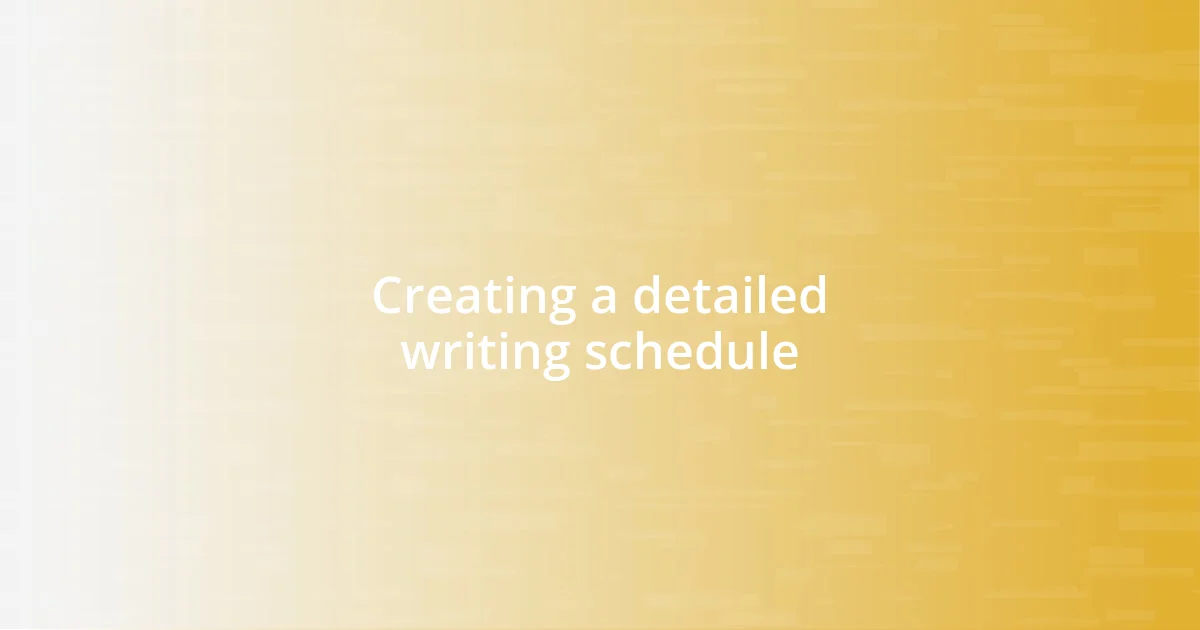
Creating a detailed writing schedule
Creating a detailed writing schedule transforms how I approach my projects. I remember a particularly hectic week when I had multiple deadlines looming. To keep myself organized, I mapped out a day-by-day schedule, specifying writing blocks and breaks. This meticulous plan not only gave me clarity but also allowed me to allocate time for revisions, which often feels like a luxury under pressure. How often do we underestimate the importance of scheduling breaks?
I’ve also learned the value of setting short, focused writing sessions. I often break my schedule into 30-minute chunks, followed by five-minute breaks to reset my mind. This approach came in handy when I was drafting an article about digital marketing strategies. After a brief pause, I always returned feeling refreshed—ready to tackle the next section with renewed energy. Have you ever found that hitting pause unlocks new ideas?
Lastly, integrating deadlines into my writing schedule is crucial. When I know specific dates for submission, I create a countdown system that motivates me. Adopting this strategy during a recent project kept me accountable and less anxious as the due date approached. I can’t help but wonder: if we embrace structure in our writing, could we find more joy in the creative process?
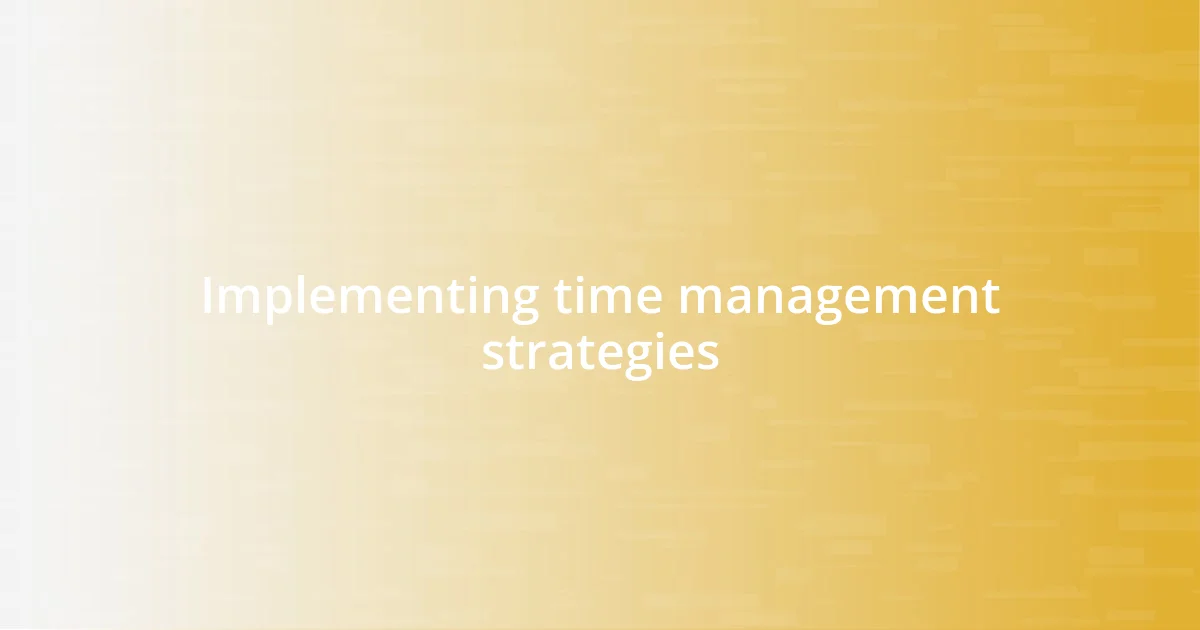
Implementing time management strategies
Implementing time management strategies effectively involves prioritizing tasks based on urgency and importance. I’ve often found myself staring at a daunting list of writing tasks, unsure where to start. To tackle this challenge, I categorize my tasks using a priority matrix, which helps me visually separate what I need to do immediately from what can wait. This method not only calms my overactive mind but also makes my workload feel much more manageable. Have you ever tried prioritizing your tasks based on their impact?
One technique that really resonates with me is the Pomodoro Technique. By setting a timer for 25 minutes of focused writing, followed by a 5-minute break, I can maintain concentration without overwhelming myself. I remember the first time I used this strategy on a tough article about social media trends. The short sprints kept my thoughts fresh, and those little breaks allowed my creativity to flourish. It’s funny how stepping back can lead you to clearer ideas, right?
Another strategy that I’ve found invaluable is reflecting on my progress at the end of each day. I like to take a few minutes to assess what I accomplished and what adjustments I might need for the next day. This reflection not only reinforces my motivation but also highlights areas where I can improve my time management further. I sometimes wonder, do we overlook the power of self-reflection in shaping our writing habits? By continually tweaking my approach, I find that I can adapt to different projects while keeping stress at bay.
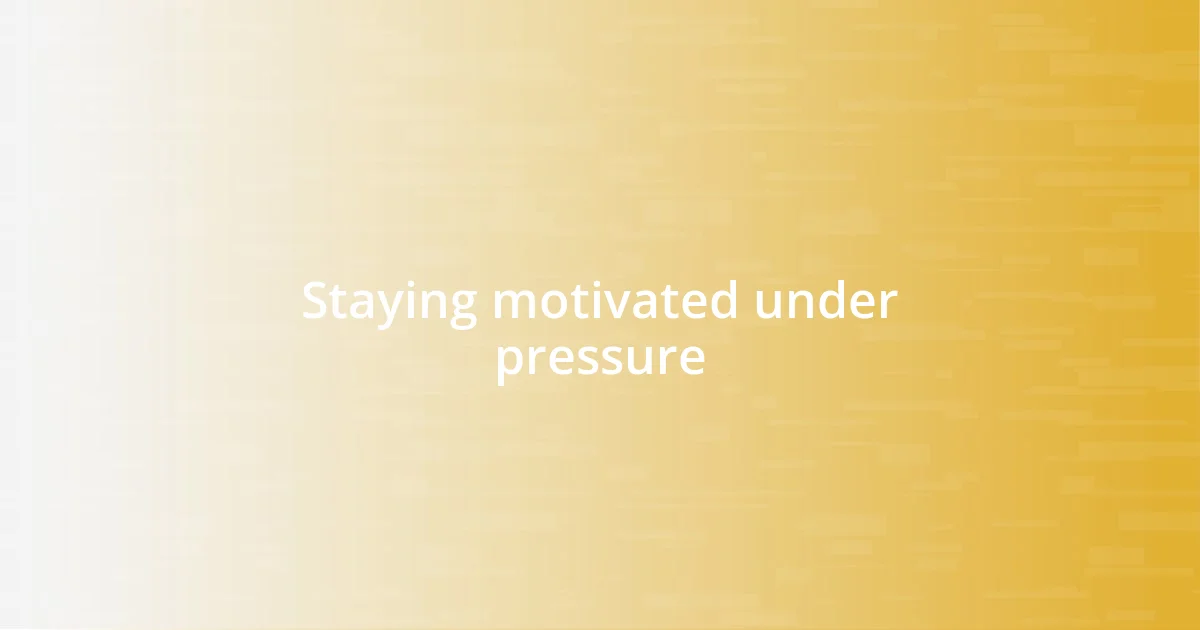
Staying motivated under pressure
Staying motivated under pressure requires a blend of determination and self-awareness. I remember a challenging period when I was juggling multiple articles with tight deadlines. To stay focused, I created a mini vision board with quotes and images that inspired me. Every time I felt overwhelmed, I would glance at that board, reigniting my passion for writing. Isn’t it fascinating how visual reminders can turn our mindset around?
Finding small victories can also carry you through the toughest days. During one particularly intense week, I made it a point to celebrate every completed paragraph, no matter how small. Whether it was treating myself to a cup of my favorite tea or sharing my progress with a friend, these little rewards kept my spirits up. Have you ever noticed how acknowledging progress boosts motivation?
On particularly stressful days, I embrace the power of mindfulness. Taking a few minutes to breathe deeply or practice gratitude can significantly shift my focus back to the task at hand. I recall a time when the pressure was mounting so high that I nearly lost sight of my goal. After pausing for a short mindfulness exercise, I not only regained my composure but also found clarity on how to tackle the next writing challenge. Could it be that slowing down might just be the key to speeding up our progress?
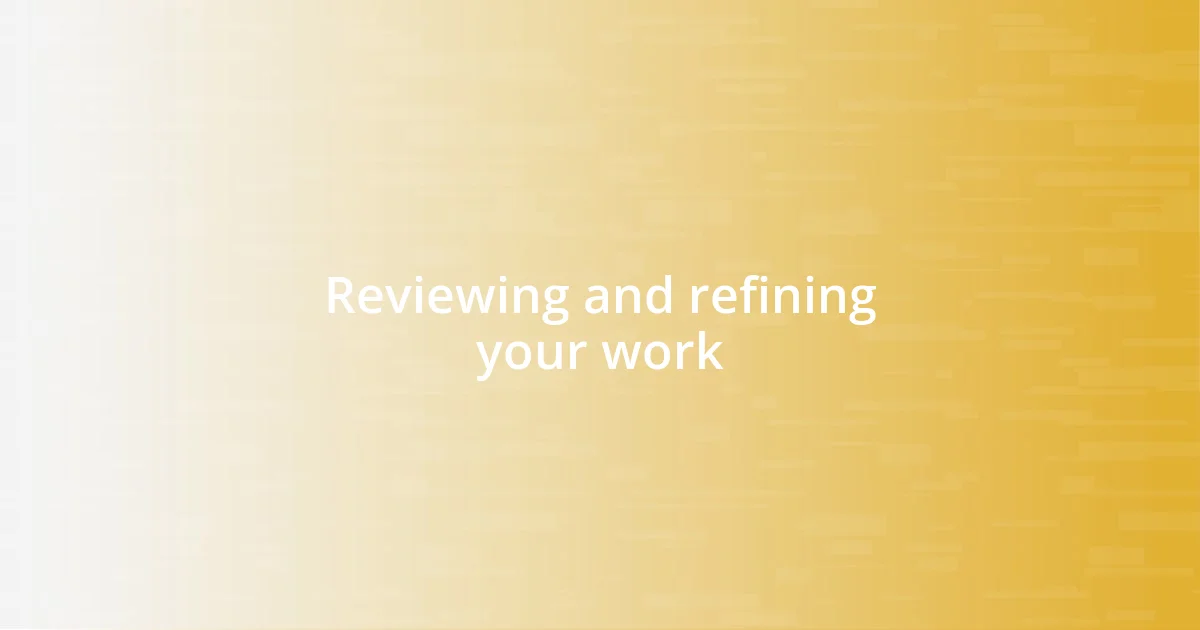
Reviewing and refining your work
Reviewing and refining my work often feels like a second chance to make my writing shine. I make it a point to let my draft breathe for a day or two before diving back in. This pause allows my brain to reset; when I finally revisit the text, I can spot glaring inconsistencies and clunky phrases more easily. Have you ever noticed how fresh eyes can unveil what you missed on the first go?
When I’m in the thick of refinement, I lean heavily on feedback from peers. I remember sharing a rough draft with a friend who is also a writer. Their insights were invaluable, especially on sections where I thought I had clarity but found out I hadn’t communicated my ideas effectively. What a revelation! Sometimes, we’re so close to our work that we can’t see it from a different angle.
I also embrace the editing process as a creative exercise rather than a chore. Each time I cut out unnecessary words or restructure a sentence, I feel a rush of satisfaction. It’s a bit like sculpting; you chip away at the excess to reveal the masterpiece underneath. Have you ever experienced that exhilarating moment when everything just clicks into place? In those moments, I can’t help but feel the magic of writing come alive again.










